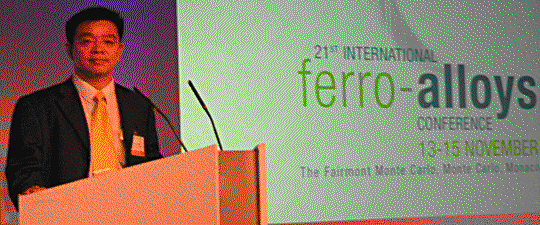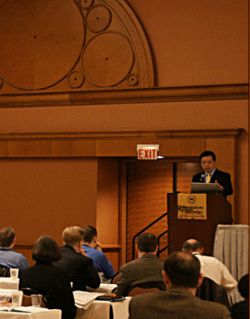
Sun Junliang is a frequent speaker at steel industry summits around the world.
MR. SUN JIANLIANG, founder and managing director of Shanghai J. Sun Trading Consultants Ltd, took a good look around the bustling city at the mouth of the Yangzte River a decade ago and realized that all the frenzied construction and infrastructural development going on at the time had at least one thing in common.
Steel.
And he also realized something else at the time that has since paid off multifold in returns.
The apparent chaos and disorder to the supply of raw materials like iron ore and coking coal -- as well as the shipment of finished steel from mills in the hinterland to urban construction sites -- was screaming out for experts to help manage the complex logistics involved.
In stepped Mr. Sun.
“As a commercial and communications hub, Shanghai is well located -- connected with inland China and overseas. With the country’s increasing openness to the outside world, Chinese are eager to expand business abroad while foreigners are likewise keen to enter China’s massive market,” Mr. Sun said in an interview with NextInsight.
“Chinese and overseas firms both need professionals to help them enter into other parties’ markets. We also help clients better manage costs and increase profits. Additionally, these professionals should be capable and independently trustworthy, with bilingual and bi-cultural backgrounds,” he said.
The fact that the interview was conducted in English in addition to Mr. Sun’s vast array of photos on his firm’s website chronicling his extensive foreign conference lecture circuit tour is testimony to these credentials.
Most impressive was the opportune timing of the decision to go down the consulting road 10 years ago.
It was during the past decade that China leapfrogged several established global players in the steelmaking industry to become the current world’s No.1 producer, and a mere five years later became a net exporter of steel.
“I established my company to attract professionals of these (aforementioned) kinds and to allow them to catch a ride along with these great commercial opportunities. And to this day, Shanghai J. Sun Trading Consultants Ltd acts as an independent service provider for sourcing, marketing and investment.”
Mr Sun, who has been a frequent speaker at industry summits around the world, is an affiliate member of The International Chromium Development Association and an associate member of The International Magnesium Association.
He said sister company PanSun International Ltd was established in 2006 to help meet growing and diversified demand from both mills, mines and traders. “They act similarly and parallel each other.”

Mr Sun speaking at the Steel Business Briefing & AIIS' North American Steel Market in Chicago in 2008.
Forged for a stimulus, steeled for a slowdown
China’s ongoing 4.5 trln yuan stimulus package, intended to take some of the bite out of the global financial meltdown, is indeed providing opportunities for steel vendors to gird up bridges, tunnels, airports, highways and high-rises.
Beijing has seen fit to declare the country’s steel sector a pillar industry, and specifically targeted as a recipient for its fair share of stimulus funds.
“On the back of the government stimulus, especially between April and August of this year, the Chinese steel market boomed again with good demand, especially from domestic traders,” Mr. Sun said.
“It helps those steel firms related to Chinese government infrastructural investment like high speed railways and expressways for many years to come on continuing orders.”
However, he said pumping government funds into the economy would not sustain demand for finished steel indefinitely, and the industry has already come down to earth from the excitement of state-sponsored order building.
“The Chinese steel market this year has faced sky-high costs of heavy stocks and upstream raw materials, including iron ore, coal and associated costs, collapsed selling prices on oversupply and overcapacity, vanishing demand, and then higher domestic market prices for steel products, followed by more anti-dumping cases against China’s steel product exports.”
He added that the market complexities of irregular raw material demand followed by historically high amounts of imported iron ore due to stockpiling aspirations has made this year, more so than any other in recent memory, a windfall period for consulting firms like Shanghai J. Sun.
“That no annual benchmark price for imported iron ore has yet been reached has further complicated matters, as well as the ongoing merger-mania of Chinese steel mills. And due to a lack of an annual contract price, spot market prices for imports of iron ore prevailing,” a condition which necessitated more proactive negotiations and therefore more business for Shanghai J. Sun Consultants.
He said the Chinese steel industry this year “will survive but it will be difficult to attain profitability.”
“In 2010, an even more severe situation will be encountered, with more competition at home and abroad as well as problems related to overcapacity and supply, less demand, a weaker US dollar against a stable Chinese yuan (which negatively impacts export competitiveness) and many more antidumping cases against China’s steel products.
“The Chinese steel industry will struggle to make a profit in 2010.”
No stranger to friction
The country is no stranger to friction with its major trade partners, and this has been another source of consulting orders for Shanghai J. Sun.
Late last month, the EU proposed a five-year antidumping duty on Chinese steel tubes of nearly 40%, and Washington recently launched an investigation into allegations that China has been dumping steel pipes in the US market.
Mr. Sun said one solution to help ease these tensions and possibly reduce the caseload is to import more steel products for certain projects, and to help reconcile output with on-the-ground demand.
“The government will try to cut overcapacity step by step. Therefore, I see more mergers of Chinese steel mills continuing.”
However, despite the often rancorous negotiations between foreign iron ore miners from Australia and Brazil and their partners in the steelmaking sector in China, Mr. Sun was more sanguine than most on the long-term health of this often complex global partnership.
He said he was not overly discouraged nor surprised by the Chinese government’s arrest earlier this year of Shanghai-based staff from Australian miner Rio Tinto, and dismissed concerns from many analysts and industry experts that the move might signal a rise in economic nationalism and protectionism in China.
“I’m not too worried about it. Every country shall act independently. Actually, I believe China is becoming more open to foreign business but only as per Chinese laws and regulations as well as international practice.”
He said that his hometown government was reaching out to smaller steelmakers in the region to help them stay afloat.
“The Shanghai Municipal Government is planning to set up government financial organizations and companies including a business center under Shanghai Pudong Development Bank to lend more financial support to SMEs. Usually in the past, SMEs -- especially private SMEs in China -- got less financial support from state financial organizations and companies,” he said.
Would savvy market players get a chance to buy a piece of Shanghai J. Sun Consultants on a bourse anytime soon?
“We don’t have any listing plans at this time. It depends,” Mr. Sun said. “In the meantime, we will continue to bring manufacturers and end-users together, just as we have been doing for over a decade now.”


 NextInsight
a hub for serious investors
NextInsight
a hub for serious investors






